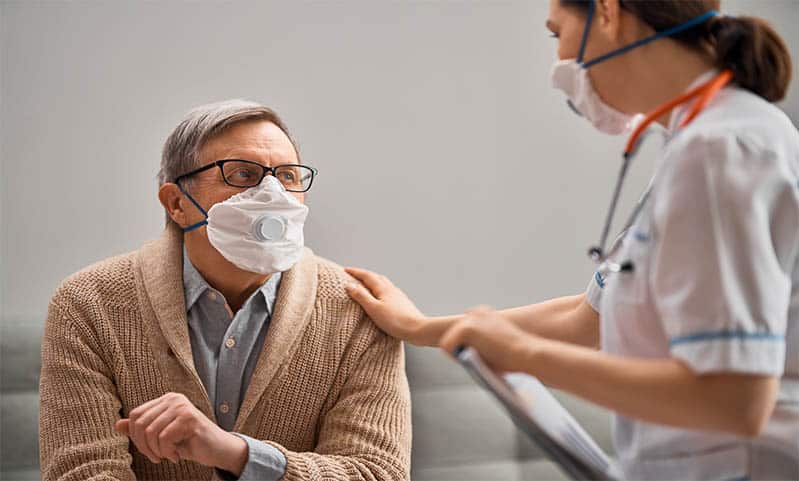Recently, there has been an increase in concern over elder abuse in nursing homes during the COVID-19 pandemic.
If you have been keeping up with the news at all, you have probably heard them say thousands of times, “There is no need to panic, this virus is killing only the elderly and those with underlying conditions,” as if huge groups of our population is expendable.
For those who live in nursing homes or have loved ones who live in these facilities, the fear of elder abuse during this COVID-19 pandemic is a real one.
That fear becomes even stronger when we hear time and again that those who we love are considered less important to society and even some of its leaders.
The issue of the undervalued lives of our elderly population is a real problem, and it needs serious attention.
This pandemic is also a major health issue and needs special procedures in place to make sure that our elderly population is protected from its threat.
The respiratory infection has swept through nursing homes in many places, including San Antonio, Texas, where a nursing home was recently cited for infection control problems and now is facing a serious outbreak of COVID-19.
Similar stories are happening all over the US, including in Brooklyn, NY, Missouri, Chicago, Seattle, Georgia, and many other locations.
COVID-19 Is A Serious Pandemic for Everyone
COVID-19, otherwise known as the coronavirus has been declared a global pandemic by the World Health Organization (WHO).
There is no need to give numbers or statistics here because they are changing minute by minute, but thousands have been killed and thousands more are expected to die in almost every country of the world from this outbreak.
The respiratory infection was once thought to only affect the elderly but has now killed people from all ages and walks of life, from the baby born to a middle-class family, to the middle-aged millionaire celebrity.
No one is exempt.
Police officers in their thirties have died in the Southern US, while British royalty in their 70s has healed from this illness in less than a week.
Despite many efforts to learn more about this virus, no one knows for sure why it kills some, sickens some, and others barely show symptoms.
While it is obviously not attacking only the elderly, the damage from such claims has already been done.
We Are Being Taught That Some Lives Don’t Matter
Just before this deadly pandemic, there was a fairly new movement flooding the internet that claimed all lives matter.
Hashtags such as #PoliceLivesMatter, #AnimalLivesMatter, and #AllLivesMatter were popping up all over Twitter and Facebook, and the importance of life was getting a lot of attention.
Now, suddenly, we have left the impression in the minds of many people that the lives of our elderly and those with underlying conditions suddenly do not matter quite as much.
This is a dangerous seed to plant into the minds of those caring for our elderly.
The media and our leaders were trying to bring comfort with the words, “It seems to only affect the elderly and those who are already sick.”
Unfortunately, it has taught us that those lives are less important instead.
The list of “underlying conditions” is so great that it covers most of our citizens.
Those with Chronic Lyme, ME, MS, or other autoimmune problems, kidney disease, diabetes, heart issues, or even just overweight people are said to be at greater risk of contracting a fatal case of COVID-19.
That is a lot of lives to deem unimportant, and yet the young and healthy are dying, too.
Nursing Home Guidelines Set by CMS
The Centers for Medicare and Medicaid Services or CMS has set guidelines for nursing homes to follow to help protect our elder population from the spread of the coronavirus.
These guidelines include clinical guidance for how to control and prevent the spread of infectious diseases in assisted living facilities, nursing homes, rehabilitation centers, long-term care facilities, and other such places.
Visitors are to be seriously restricted, and in most places, visitors are not allowed at all.
The health care workers who are caring for the residents of these places are also under strict scrutiny.
Employees should be monitored for any signs of this respiratory infection such as fevers, shortness of breath, coughing, sore throat, and more.
Any worker who shows signs of the virus should immediately be sent home and tested for COVID-19.
If that person is positive for the virus, anyone who they came into contact with should also be tested.
Patient Needs Must Still be Met
While the coronavirus pandemic is a major health crisis that demands a lot of changes, the needs of the patients and residents in these facilities must still be met.
While visiting may be restricted or not allowed in your loved one’s care facility, some places are still making it possible for loved ones to visit via video calls or through the resident’s windows.
It is important that you keep in contact with your loved one in any way possible to ensure that they are being cared for as they should be.
Even just a daily phone call would help in most cases.
If you feel that your loved one is not being protected from COVID-19, or if a loved one has contracted this illness in a care facility and you feel that it is because of the negligence of the staff, you should immediately call a nursing home abuse and neglect attorney.
That call should also be made if you feel that your loved one’s needs are not being met throughout this crisis, or anytime in the future.
Many of our elders and “people with underlying conditions” can no longer speak up for themselves, and it is our job to speak for them.
